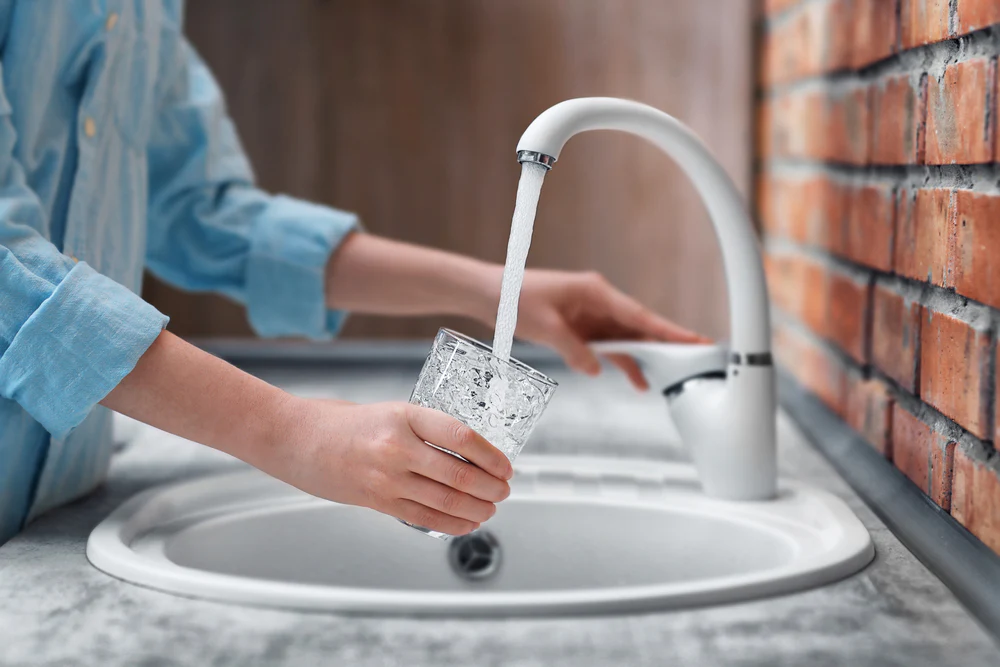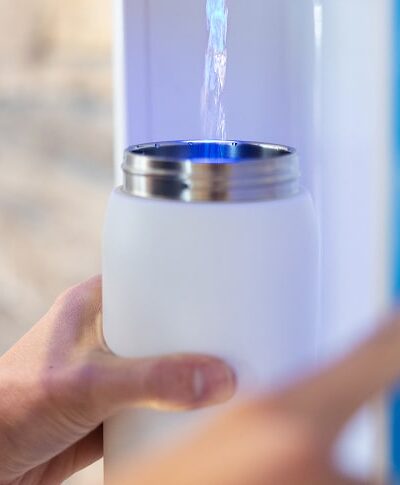Everyone talks about that morning cup of coffee as a way to jumpstart the day and be productive, but what about the rest of the workday? Any grogginess you may feel right before lunch or mid-afternoon most likely is due to lack of hydration. When your total body water decreases, your body doesn’t have enough water to perform its healthy functions. It’s at this point dehydration sets in from fluid loss. Water dehydration symptoms include dry mouth, dry skin, muscle cramps, fatigue, dizziness, and confusion, among others. How do you prevent this? Drink water! It’s recommended by healthcare professionals to drink a minimum of eight glasses of water every day. A great alternative to plastic water bottles is drinking water from aluminum water bottles as this reduces plastic waste in the environment while providing fresh and clean tasting water.
With the chaos of a jam-packed workday or weekend filled with physical activity, the goal of drinking more water may be easier said than done. However, being intentional about your water intake can have a positive impact on productivity. Intaking water throughout the day will help to keep you alert and be more focused while you work. Learn more about how hydration contributes to your health and functioning at work and ways to ensure you’re getting enough water throughout the day.
Boosts Brain Function
Evidence shows mild dehydration can affect your mood, memory, and brain performance. A study published in the Journal of Nutrition found that even a 1.4 dehydration level resulted in headaches, lower concentration, increased perception of task difficulty, and a degraded mood, which is a commonly unknown dehydration symptom. Environmental factors like temperature can also cause your hydration levels to dip early on in the day, enough to contribute to these side effects.
For a job that keeps you sedentary for most of the day, aim to drink at least one or two glasses of water per hour to stay hydrated. If your job requires you to be on your feet for several hours at a time or you’re working outside in warmer temperatures, consider increasing your intake to accommodate for water lost through excessive sweating, or fluid loss. Getting yourself to drink eight glasses of water a day is only a starting point to what your body may actually require to stay hydrated.
Regulates Blood Pressure
Plasma is made up of approximately 90 percent water, which means severe dehydration can cause your blood to become more concentrated and lack electrolytes that aid in proper heart and muscle function. Electrolytes produce energy and allow your body to function correctly. In addition, staying hydrated helps balance blood volume and blood pressure to reduce feelings of being lightheaded or dizzy.
At work, coordinate water breaks with a few moments to get up and stretch or take a quick walk around the block, particularly if you’re sitting at a desk for the majority of your day. Pairing the two activities together can make it easier to remember to fill up your water bottle and lower blood pressure with exercise.
Fights Fatigue During the Day
Another leading water dehydration symptom is fatigue. When you’re feeling sleepy, productivity often declines. Relying on caffeinated or sugary drinks to keep your energy levels going at work can lead to crashes later on in the day. Consistently drinking water keeps your hydration at a healthy level to fight fatigue.
Also, skip the bag of chips or other salty snacks, which can make you feel bloated and weighed down. Instead, double up on your water intake by reaching for a piece of fruit or other hydrating snacks like sliced cucumbers or a bowl of yogurt topped with granola. Foods rich in nutrients, rather than salt and fat, will boost your brainpower and keep you more productive throughout the day. This will, also, help to stabilize body weight.
Eliminates Toxins from the Body
An additional benefit of drinking water is that it rids your body of toxins and keeps your immune system healthy. This is particularly important during the cold and flu season, since it helps ward off infection. One of the key things doctors recommend when you catch a cold is to increase your fluid intake. Why? Consistently intaking fluids keeps the body properly hydrated and functioning at its optimal capacity.
Round out preventative care by following a balanced diet and getting plenty of rest. These, along with proper fluid hydration, will help you maintain optimal health and keep your body’s functions in good working order. Nothing impacts productivity faster than being down and out with a cold.
Also, regular urination of bodily fluids caused by consistent fluid intake can aid with removing unwanted toxins from within your body. Frequent dark urine is a well known sign of chronic dehydration and should be a signal for the need to increase your water consumption.
Reduces Caffeine and Sugar Intake
Findings from data acquired from the U.S. Department of Health and Human Services reveal that fruit drinks, soda, energy or sports drinks make up 42 percent of the average sugar intake. Committing to drinking more water as an alternative to coffee and energy drinks reduces the amount of caffeine and sugar you consume each day.
Too much caffeine can leave you feeling jittery, unfocused, and affect your sleep. It can also lead to water dehydration symptoms, such as headaches, nervousness, and irritability. All of these decrease productivity and effectiveness of the tasks you are able to complete. Plus, high sugar levels can lead to heart disease, an irregular heart rate, high blood pressure, obesity, and other adverse health effects over an extensive period of time. Start the habit of reaching for water when you have a thirst for something to drink or feeling low on energy. You may be surprised how much hydration plays a part in perking you up.
Aids in Digestion
Lunch is usually a lighter meal of the day, but poor digestion can cause you to feel sluggish, leading to an afternoon slump. Drinking water with your meal allows your body better to absorb your food’s nutrients and aid in digestion. Rather than feeling weighed down, you’ll feel more energized to tackle the afternoon when you’ve had plenty of water to accompany your meal.
Tips for Staying Hydrated Throughout the Workday
Rehydration, or drinking fluids consistently throughout the day, helps you maintain a higher level of productivity. To ensure you’re getting the daily recommended intake and avoiding moderate dehydration symptoms as much as possible, set yourself up for success by following these simple tips.
Start Your Day with a Glass of Water
Although a coffee from the drive-thru or a smoothie at home may be your normal start to the day, try drinking a full glass of water as soon as you wake up. This works to jumpstart your metabolism, getting you in the habit of turning to water in the morning before anything else.
Set a Reminder
Developing a habit takes time. Try setting an alarm on your phone or a calendar notification to fill up your glass at least once per hour. It’s always easy to get so caught up in meetings and projects without taking a break. Since most people work at least an eight-hour workday, this ensures you get the minimum recommended intake.
Buy a Gallon Jug
Fill up a gallon jug in the morning and make it a goal to finish by the end of the day. Some jugs are marked with words of encouragement at different water levels, which allows you to visualize your progress. The FloWater Refill Station has an open dispensing area that fits any size of container, making it easy for employees to fill up once a day and pour out a little at a time at their desks. Fewer trips to get water means more time to stay focused on the tasks at hand.
Sync Up with an App
Technology can play a pivotal role in your hydration and subsequent workplace productivity. There are several apps that will track your water intake goals. There’s even a water bottle that recommends an amount of water for you and sends a notification when it’s time to take a sip. For those who love data and like to see results, having a water bottle or jug that shows you measurements of how much water you drink per day may be just the motivation you need.
Challenge Your Co-Workers
There’s nothing like a little in-office competition to motivate you to reach your goals. See who can consistently meet their daily water intake for a set period of time or drink the most water overall. Award a prize at the end to the person who comes out on top. You can, also, set up your own goals and treat yourself at the end of the month.
Get More from Your Water
FloWater encourages everyone to stay hydrated at work with its clean, refreshing taste. The advanced filtration system in our water bottle refill station amplifies the benefits of drinking water daily. For example, to maintain hydration and add back electrolytes filtered out from tap water in the earlier steps, FloWater’s sixth stage of filtration enhances the water with magnesium, potassium, calcium, and sodium. These help the body with immune defense and cell repair, while keeping you energized throughout the day.
An alkaline enhancement adds a proprietary blend of minerals to raise the water’s pH level and neutralize acidity in your body. High acidity levels are caused by factors like an unbalanced diet, stress, and environmental impurities. This causes your internal organs to work even harder to alleviate the stress.
Five other filters, including advanced osmosis and activated oxygen, round out the advanced water purification process that removes 99 percent of contaminants and transforms tap water. Additionally, the FloWater Refill Station makes it easy to fill up any sized water container with a simple push of a button or pedal.
Start tracking how much water you drink per day and how much your productivity and concentration levels improve. You may be surprised about how much (or little) you’re actually drinking per day.
Sources:
- https://www.mayoclinic.org/diseases-conditions/dehydration/symptoms-causes/syc-20354086
- https://www.healthline.com/nutrition/7-health-benefits-of-water
- https://academic.oup.com/jn/article/142/2/382/4743487
- https://www.everydayhealth.com/water-health/water-body-health.aspx
- https://www.health.harvard.edu/heart-health/the-sweet-danger-of-sugar
- https://health.gov/sites/default/files/2019-09/2015-2020_Dietary_Guidelines.pdf




